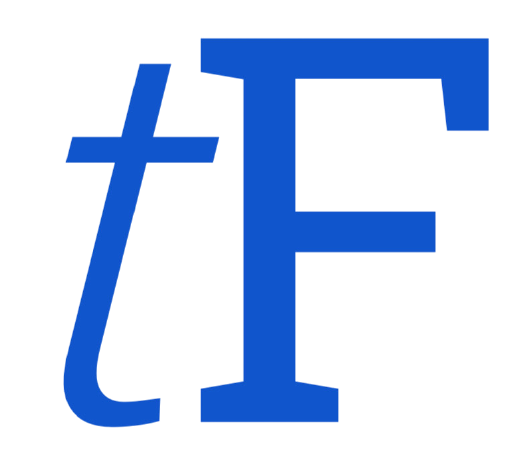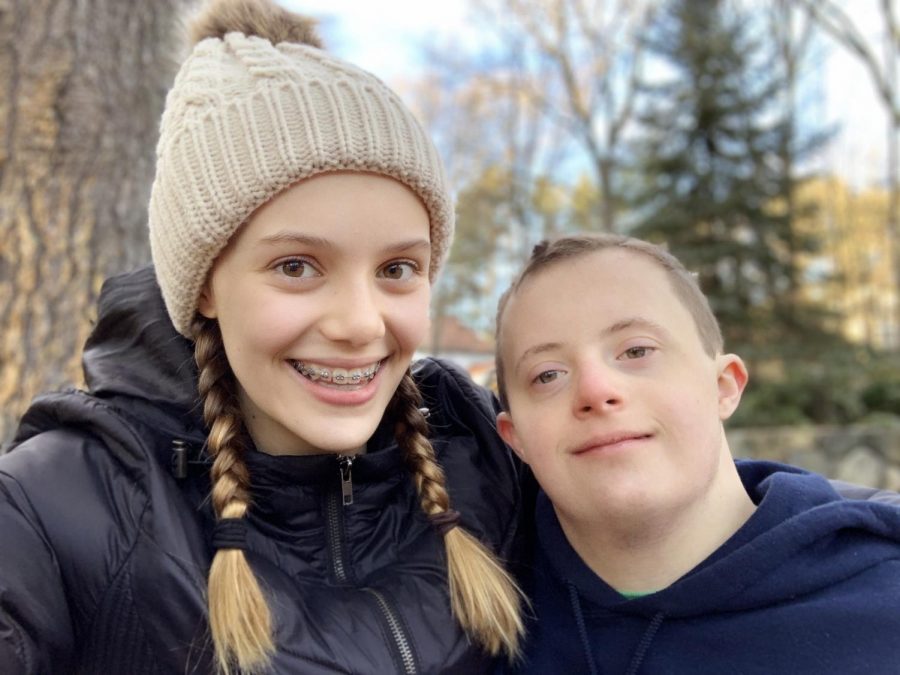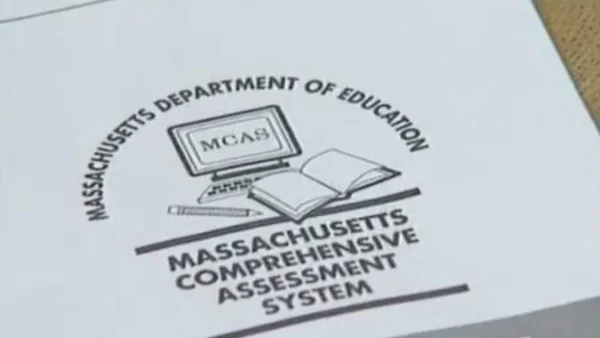Not Your Typical Student
Siblings Ann and Max Badowsky.
Let me tell you about my brother, Max Badowsky. Max is 18 years old and a senior at LS. He loves to play video games and watch Youtube. All year long, Max plays baseball, basketball, ice skating, tennis, and mini-golf (if that counts as a serious sport). Every day he goes to school and sees his close friends and teachers. Pretty normal kid, right? On paper, he seems like every other teenage boy, but when you see him in person, he looks much different than what you would expect.
Max has Down syndrome, which is a genetic condition where someone is born with an extra chromosome. This affects a person’s developmental changes, both cognitive and physical. For instance, it took Max years to ride a bike, but now he hits mountain biking trails with my dad each weekend. Max also takes longer to learn academic skills. Max’s REACH classroom has blocks that look a little bit like yours and mine. He also has a home tutor so that he can learn as much as possible in a one-on-one setting. Other people think that he should be learning faster and that he should be more comfortable with common skills but it makes me proud to see Max speaking in full sentences or counting out money at the store.
Max will be considered a Senior for the next four years. He can keep learning at LS until he is 22. He will never officially graduate from high school since he can’t take the MCAS. It always makes me sad when I realize I can’t watch my brother graduate like so many others have been able to do.
Max is constantly in the middle of a sports season because he has to stay as active as possible. He has low muscle tone, which means that he physically has to work harder to do everything, including just standing. Through Special Olympics teams, he gets to exercise and meet new people.
Every day he goes to school on the bus and gets to go to classes with his close friends. Mary Ann Grady, Max’s teacher at the REACH program, explains that he has “set blocks dedicated to ELA, math, other content areas, and life and vocational skills, which makes for a pretty diverse and interesting day.” Each week the class collects the recycling around the building, waters the plants in the hallways, and helps out with specific clerical tasks. Before the pandemic, in order to make “real world” connections to what he learns in his class, Max’s class volunteered at the Goodnow Library, food pantry (they set up around 500 shopping bags per week), town offices, Buddy Dog, and a local farm.
Despite these enriching experiences, the only time Max gets to interact with typical students is in the hallway and the occasional Wellness classes. This makes it harder for him to meet people who aren’t like him. Seeing typical friends in the hallway is always exciting for him, even if he acts like he’s too cool to talk to them.
When I was growing up, pre-med doctors came to our house and asked my family questions about living with someone with Down syndrome. This is a part of their learning — to see the “face behind the syndrome.” I never knew what to say to the doctors, because having Max as a brother always seemed so normal to me. I’ve always been told that Max was different and sometimes he has to be treated differently, but I don’t see how it can be so unfamiliar to someone. I mean, Max has taught me a lot about patience, much more than a typical brother could. It takes him a little bit of extra time to do things, but he is persistent and will get it done. Max has also taught me how to care for other people’s feelings. The most obvious lesson that Max has taught me is how to be accepting of different people. I have met many people like Max who have different kinds of learning disabilities. I’ve gotten to see how different people learn and how they interact with others. Being exposed to people who aren’t like me at a young age helps me be more accepting.
It always breaks my heart when people make assumptions about Max just because he looks or acts differently from a typical person. Let’s say a student is unfamiliar with the students in the REACH program. Who can blame them? The student has probably only seen students with disabilities in the hallway and likely has no classes with them. This allows room for the student to make assumptions about what happens inside the REACH classroom. Someone once said to me, “Why do those students push around garbage cans all day, shouldn’t they go back to learning their ABCs?” The student was so oblivious to what happens inside Max’s classroom, and it led him to make false assumptions. It’s hard knowing that some students at LS think that my brother doesn’t know his ABCs, especially when he can read! After the incident, I told myself, “Isn’t that guy dumb, he should know better.” But at the same time, how was this student supposed to know what the REACH students do? Nobody has told him that students work on both academic skills and life skills in his class. Most people don’t even know it’s called the REACH program, and whenever I mention it, they give me a confused look.
Over the past couple of years, I have taken part in all sorts of different workshops and presentations about the different kinds of students at LS and how I can be more accepting of them. Even in elementary school and middle school, we were taught to accept others, even if they are different from us. Yet, I have never learned much of anything about disabilities in school. It was weird for me not to be educated about Down syndrome or other types of intellectual disabilities. Even to this day, I sometimes don’t know how to interact with Max’s friends or what goes on in his classroom. If I am feeling this way, I can’t imagine what other members of the school community think about when it comes to people with disabilities.
I’ve gotten many questions about Max and other students at LS with special needs, and while I understand that I am a great resource for those who are unfamiliar with the REACH program, I think there should be other ways for students and teachers to get information about their classroom besides myself. I am aware students with disabilities make up a small percentage of our LS community, but seeing my classmates be disrespectful towards people like Max is exhausting. That is why I wish we had something that can give students a bigger understanding and exposure to the different types of students at our school, whether a presentation or an article for students. Having the REACH program isolated from the rest of our school community doesn’t make us a more accepting school. By allowing LS community members to learn about the students in the REACH program, we can make the students feel like they are truly a part of LS and not outcasts who are stared at in the hallways. If students with disabilities have more interactions with the rest of the community, it can improve their social skills and help them to build friendships. Not only that, but it allows students and staff to work towards our core values of LS: Fostering caring and cooperative relationships, respecting human differences, pursuing academic excellence, and cultivating community.
All I am asking is that you, as a person, build awareness. Everyone doesn’t have to talk to Max every day, but I wish our community could be more accepting towards students with special needs. If students have been enthusiastic about accepting people who are different than us in earlier grades, there should be no worries learning more when there is such big meaning behind it. And sure, even after students have access to simple education on disabilities, insults and assumptions are going to continue. People are still going to swerve away from special needs students in the hall and think of them as stupid and say the R-word without knowing the meaning behind it. Mary Ann Grady said, “I don’t think students need to specifically be taught about students with special needs; I think the WORLD needs reminders to be considerate of all people and all differences.” By paying greater attention to differences, families and friends of students with special needs can rest assured that LS is becoming more aware and accepting of students with disabilities.





Sandy Crawford • Jan 4, 2021 at 10:16 am
Ann, thank you for this honest, eloquent, and profound article. Max lights up L-S with his energy and mischievous sense of humor; we are lucky to have him as part of our community. While in many ways he is not a typical student, I, like you, want to make a school, and a world, where we expand our narrow view of what is “normal.” When we step back and examine it, I think we can rationally see that human diversity of all kinds IS actually what is typical. Human difference is the norm, not the exception. The disability rights movement has a slogan, “All means all.” This slogan calls for removing the barriers which prevent the participation of disabled people in all areas of life, but in the process it calls on us to create a world that is inclusive of everyone. When we make a school, and a world, that celebrates and welcomes Max for all that he is, we are helping to make a school, and a world, where all of us can be welcomed and celebrated for all that we are. This benefits everyone.
Cindy Simon • Dec 25, 2020 at 10:38 am
Thank you, Ann, for sharing this great information with all of us. And thank you, Max, for becoming a household legend in my family. My 16 year old was lucky enough to spend time with Max this summer and learned SO MUCH from him about everything from video games to music to remembering sunscreen before biking to the pool. We have integrated so many “Max sayings” into our family dialog that he is part of our family almost every day. Love you, Max and friends!
William Conti Bailee’s dad • Dec 21, 2020 at 9:50 am
Thank you for writing such a superbly informational essay on children with special needs! You brought forth the need for awareness and the abilities these children have! My Bailee loves making Italian pasta and meatballs on sundays for our family! She learned by watching her parents and began helping initially but now takes it upon herself to prepare the meal on her own! Her recipe is from her Italian grandad! Except her sauce and meatballs might be a tad tastier! These children can do anything they put there minds too! We are blessed to have them in our lives! Bailee has taught me so much! Thank you for your articl
Daniel Hershey • Dec 21, 2020 at 6:49 am
Nicely said, Anne!
I agree that our community needs more integration so that we don’t fear that which we don’t know or understand. Hopefully your article and advocacy can start a trend towards integration, understanding and acceptance.
We love Max and I’m sure others will feel the same way if they take a moment to get to know him.
Sincerely,
Dan Hershey
Amy Canute • Dec 20, 2020 at 4:38 pm
Ann, GREAT essay! You make an excellent point about the lack of exposure for the majority of LS students to kids with special needs like Down Syndrome. I also love that you point out how very hard Max and other kids with special needs work to achieve what others take for granted. And we know here in our house that being the sibling of someone with special needs can sometimes be tough since others don’t understand. You are obviously a great sister!